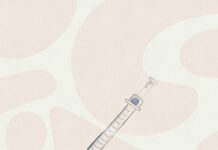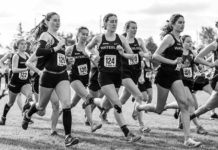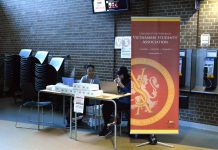The Dutch queen and king visited UW to witness the signing of a memorandum of understanding between UW and Delft University of Technology in the Netherlands — which will increase research collaboration between the two institutions — and marked the launch of the Liberation Scholarship Program on May 28.</p>
The Liberation Scholarship Program will consist of 70 scholarships for Canadian students wishing to study in the Netherlands for three to 12 months between 2015 and 2017. These scholarships are given by the government of the Netherlands to celebrate 70 years of liberation and the sacrifice made by Canadian soldiers in liberating the Netherlands. The scholarships will cover the travel to the Netherlands, tuition, and housing.
The events took place in the QNC building, with students and community members lining up around the building’s entrance and inside the hallways to welcome their Majesties King Willem-Alexander and Queen Máxima of the Netherlands.
First on the agenda for the royal couple was the signing of agreements between Waterloo Region and the Eindhoven Brainport Region, and between UW and Delft University. Ken Seiling, chair of Waterloo Region, and Rob van Gijzel, the mayor of Eindhoven, were on hand to sign the regional agreement.
Feridun Hamdullahpur, president of UW, and Anka Mulder, vice-president for education and operations at Delft University, signed the institutional agreement. The agreement between UW and Delft centres on quantum information, seeking to increase exchange opportunities and collaboration on research.
In his opening remarks, Hamdullahpur called the occasion “a very special day in our history, the history of our university, the history of our province, the history of our country.”
Following the official signing of the partnership agreement, the Dutch delegation, which included minister of foreign affairs Bert Koenders, and minister of education, culture, and science Jet Bussemaker, joined academics from UW and the Dutch university, who had been discussing best practices in higher education.
As part of the launch of the Liberation Scholarship Program, both Dutch ministers spoke of the relationship between Canada and the Netherlands.
Koenders spoke not only of the relationship built between the two nations as a result of Canada’s role in the liberation of the Netherlands during World War II, but also of the Netherlands’ role in the peace negotiations during the War of 1812. Koenders expressed his best wishes for the first six recipients of the scholarship, not only to enjoy their time in the Netherlands, but a hope “that you will come back to Canada as ambassadors honoring the special ties that exist between our countries.”
Bussemaker awarded the first six recipients of the scholarship with a certificate of recognition. The six recipients, who were all present, also received congratulations from the royal couple.
A video was showcased that will be used to promote the scholarships. The video showed the relationship between the two countries since World War II and played on the well-known Dutch symbol of tulips, along with windmills and KLM.
One of the recipients of the scholarship, Terran Shaver, a student from Athabasca College in Alberta, is the granddaughter of a World War II veteran that took part in the liberation of the Netherlands. Her grandfather, Colonel Shaver, was in attendance and noted that he was 24 when he served in the Netherlands and his granddaughter will turn 24 while on the exchange.
A UW student was among the six recipients of the scholarship. Madelaine Liddy, a masters student at IQC, will be studying at Delft University later this year.
“It’s really exciting to be the student to go and make a big play in that collaboration,” said Liddy.






























